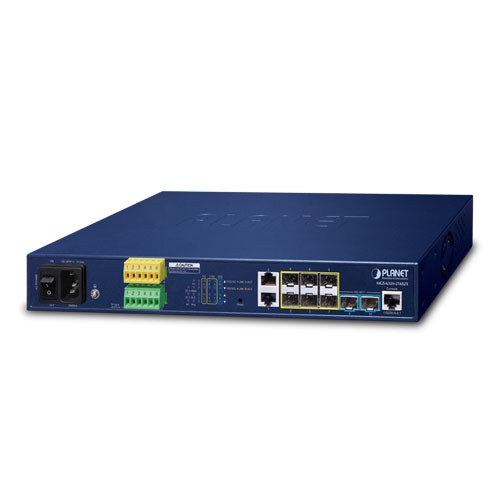

Planet
Planet MGS-6320-2T6S2X L3 2-Port 100/1000T + 2-Port 100/1G SFP + 4-Port 100/1G/2.5G
Usually Ships in 10 - 12 days
Multi-gigabit SFP Fiber Port Switch for Growing Long-Reach Networking of Enterprises, Telecoms and Campuses
PLANET MGS-6320-2T6S2X Layer 3 Managed Metro Ethernet Switch supports both IPv4 and IPv6 protocols and Layer 3 OSPFv2/v3 dynamic routing and static routing, and provides 2 100/1000Mbps TP ports, 2 100/1000Mbps dual speed SFP fiber ports, 4 100/1000/2500Mbps SFP ports and 2 1G/2.5G/10Gbps SFP+ ports delivered in a rugged strong case. It is capable of providing non-blocking switch fabric and wire-speed throughput as high as 68Gbps in the temperature range from -10 to 60 degrees C without any packet loss and CRC error, which greatly simplify the tasks of upgrading the enterprise LAN for catering to increasing bandwidth demands. With such a favorable data link capability, hardware-based Layer 3 routing performance, Layer 2 and Layer 4 switching engine and user-friendly yet advanced IPv6/IPv4 management interfaces, the MGS-6320-2T6S2X is specially designed for service providers to deliver profitable long-distance Ethernet network and adopts “Front Access” design, making the wiring and maintenance of the MGS-6320-2T6S2X placed in a cabinet very easy for technicians.
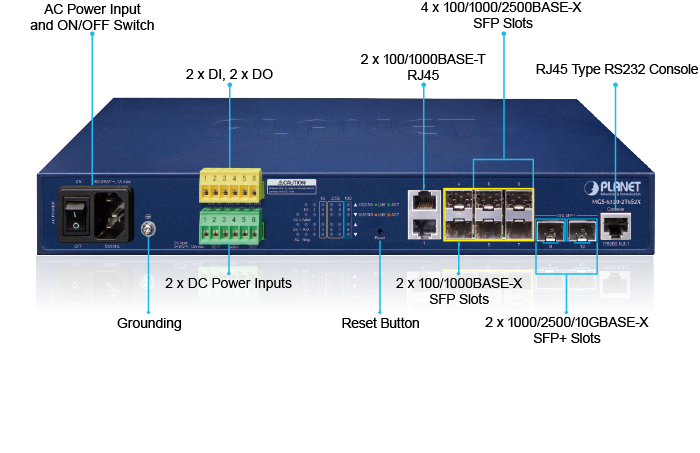
Flexible and Extendable 10Gb Ethernet Solution
10G Ethernet is a big leap in the evolution of Ethernet. Each of the 10G SFP+ slots in the MGS-6320-2T6S2X supports triple speed and 10GBASE-SR/LR or 2500BASE-X and 1000BASE-SX/LX. With its 2-port,10G Ethernet link capability, the administrator now can flexibly choose the suitable SFP/SFP+ transceiver according to the transmission distance or the transmission speed required to extend the network efficiently. The MGS-6320-2T6S2X provides broad bandwidth and powerful processing capacity
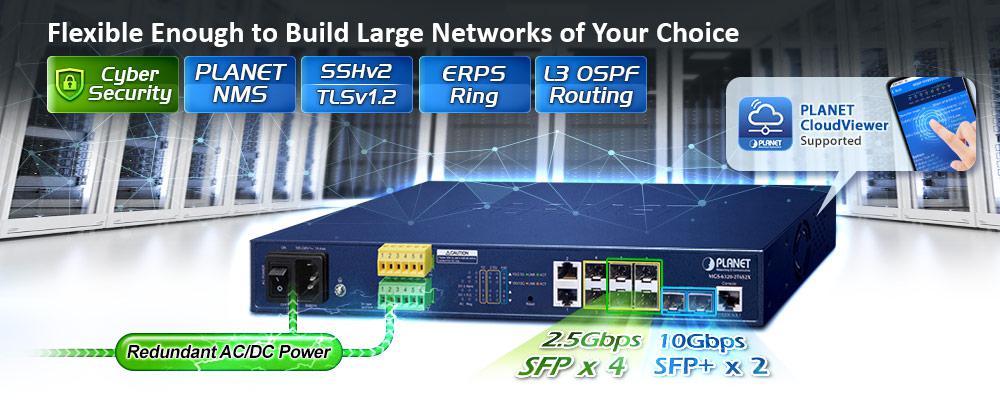
Redundant Ring, Fast Recovery for Critical Network Applications
The MGS-6320-2T6S2X supports redundant ring technology and features strong, rapid self-recovery capability to prevent interruptions and external intrusions. It incorporates advanced ITU-T G.8032 ERPS (Ethernet Ring Protection Switching) technology and Spanning Tree Protocol (802.1w RSTP) into customer’s network to enhance system reliability and uptime in harsh environments. In a certain simple Ring network, the recovery time could be less than 10ms to quickly bring the network back to normal operation.
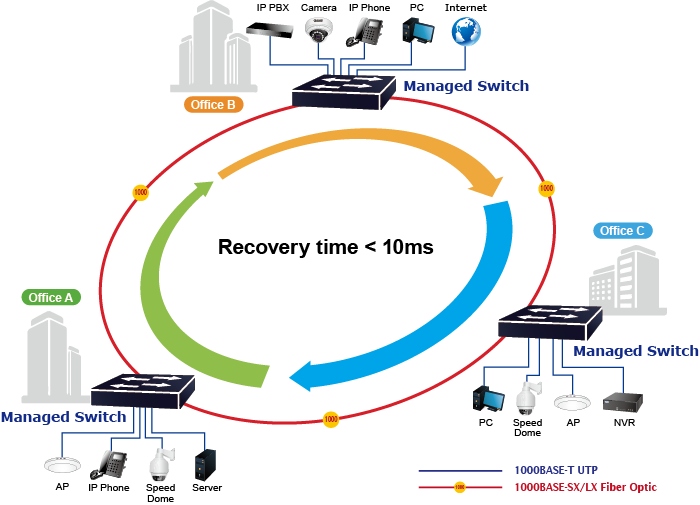
AC and DC Redundant Power to Ensure Continuous Operation
To enhance the operation reliability and flexibility, the MGS-6320-2T6S2X is equipped with one 100 ~ 240V AC power supply unit and two additional 24 ~ 57V DC power input connectors for redundant power supply installation. The Redundant Power Systems are specifically designed to handle the demands of high tech facilities requiring the highest power integrity. Furthermore, with the 24~ 57V DC power supply implemented, the MGS-6320-2T6S2X can be applied as the telecom level device that could be located in the electronic room.
Digital Input and Digital Output for External Alarm
The MGS-6320-2T6S2X supports Digital Input, and Digital Output on the front panel. The external alarm offers technicians the ability to use Digital Input to detect, and log external device status (such as door intrusion detector) for the alarm as Digital Output could be used to alarm if the MGS-6320-2T6S2X has port link down, link up or power failure.
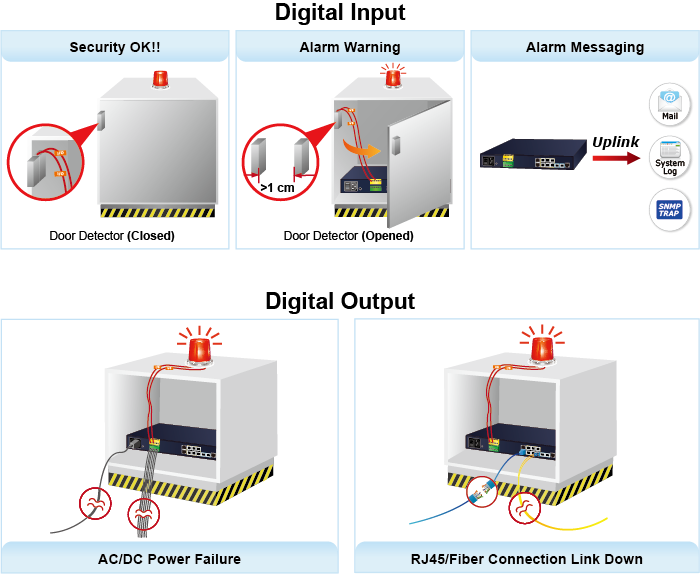
Cybersecurity Network Solution to Minimize Security Risks
The cybersecurity feature included to protect the switch management in a mission-critical network virtually needs no effort and cost to install. Both SSHv2 and TLSv1.2 protocols are utilized to provide strong protection against advanced threats. The network administrator can now construct highly-secure corporate networks with considerably less time and effort than before.
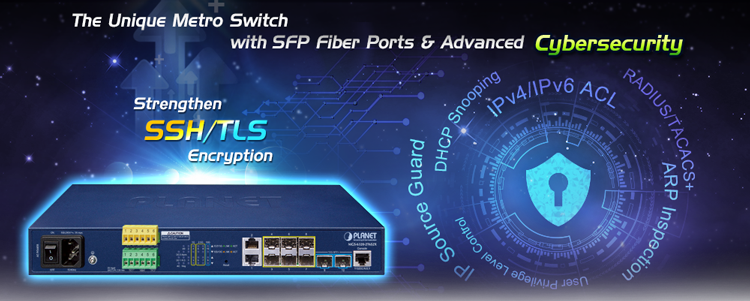
Cost-effective IPv6 Managed Gigabit Switch Solution for Metro Ethernet
To fulfill the demand for ISP to build the IPv6 (Internet Protocol version 6) network infrastructure speedily, the MGS-6320-2T6S2X supports both IPv4 and IPv6 management functions. It can work with original IPv4 network structure and also support the new IPv6 network structure. With easy and friendly management interfaces and plenty of management functions included, the MGS-6320-2T6S2X Metro Ethernet Switch is the best choice for ISP and service providers to build the IPv6 FTTx edge service and for industries to connect with IPv6 network.
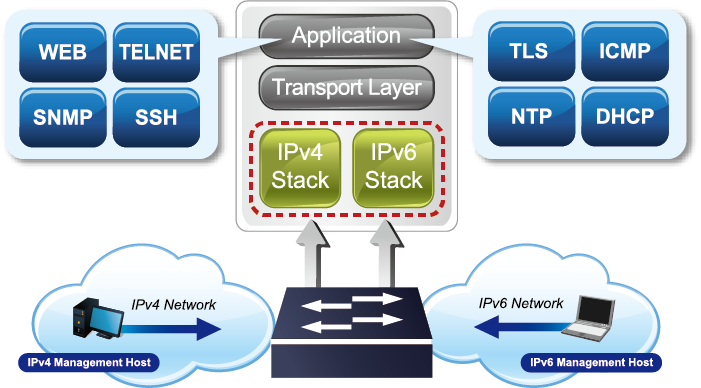
Layer 3 Routing Support
The MGS-6320-2T6S2X enables the administrator to conveniently boost network efficiency by configuring Layer 3 IPv4/IPv6 VLAN static routing manually, the RIP (Routing Information Protocol) or OSPF (Open Shortest Path First) settings automatically.
The RIP can employ the hop count as a routing metric and prevent routing loops by implementing a limit on the number of hops allowed in a path from the source to a destination.
The OSPF is an interior dynamic routing protocol for autonomous system based on link state. The protocol creates a database for link state by exchanging link states among Layer 3 switches, and then uses the Shortest Path First algorithm to generate a route table based on that database.
Robust Layer 2 Features
The MGS-6320-2T6S2X can be programmed for advanced switch management functions such as dynamic port link aggregation, 802.1Q VLAN and Q-in-Q VLAN, Multiple Spanning Tree protocol (MSTP), loop and BPDU guard, IGMP snooping, and MLD snooping. Via the link aggregation, the MGS-6320-2T6S2X allows the operation of a high-speed trunk to combine with multiple ports, and supports fail-over as well. Also, the Link Layer Discovery Protocol (LLDP) is the Layer 2 protocol included to help discover basic information about neighboring devices on the local broadcast domain.

Efficient Traffic Control
The MGS-6320-2T6S2X is loaded with robust QoS features and powerful traffic management to enhance services to business-class data, voice, and video solutions. The functionality includes broadcast/multicast storm control, per port bandwidth control, IP DSCP QoS priority and remarking. It guarantees the best performance for VoIP and video stream transmission, and empowers the enterprises to take full advantage of the limited network resources.
Powerful Security
The MGS-6320-2T6S2X offers comprehensive Layer 2 to Layer 4 Access Control List (ACL) for enforcing security to the edge. It can be used to restrict network access by denying packets based on source and destination IP address, TCP/UDP ports or defined typical network applications. Its protection mechanism also comprises 802.1x Port-based user authentication. With the private VLAN function, communication between edge ports can be prevented to ensure user privacy. The network administrators can now construct highly-secure corporate networks with considerably less time and effort than before.
Advanced IP Network Protection
The MGS-6320-2T6S2X also provides DHCP Snooping, IP Source Guard and Dynamic ARP Inspection functions to prevent IP snooping from attack and discard ARP packets with invalid MAC address. The network administrator can now build highly-secure corporate networks with considerably less time and effort than before.
Efficient Management
For efficient management, the MGS-6320-2T6S2X is equipped with Command line, Web and SNMP management interfaces.
- With the built-in Web-based management interface, the MGS-6320-2T6S2X offers an easy-to-use, platform-independent management and configuration facility.
- For text-based management, it can be accessed via Telnet and the console port.
- By supporting the standard SNMP protocol, the switch can be managed via any SNMP-based management software.

Remote Management Solution
PLANET's Universal Network Management System (UNI-NMS) and CloudViewer app support IT staff by remotely managing all network devices and monitoring PDs' operational statuses. Thus, they're designed for both the enterprises and industries where deployments of PDs can be as remote as possible, without having to go to the actual location once a bug or faulty condition is found. With the UNI-NMS or CloudViewer app, all kinds of businesses can now be speedily and efficiently managed from one platform.
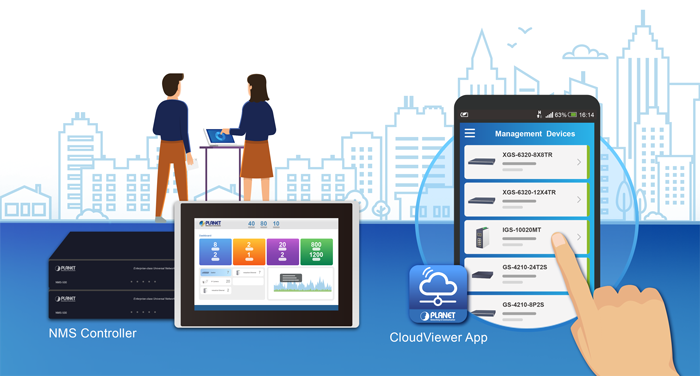
Flexibility and Extension Solution
The mini-GBIC slots built in the MGS-6320-2T6S2X support multi-speed, 100BASE-FX, 1000BASE-SX/LX, 2500BASE-X and 10GBASE-X SFP (Small Form-factor Pluggable) fiber-optic modules, meaning the administrator now can flexibly choose the suitable SFP transceiver according to not only the transmission distance but also the transmission speed required. The distance can be extended from 300 meters to 2 kilometers (multi-mode fiber) and up to above 10/20/40/60/80/120 kilometers (single-mode fiber or WDM fiber). They are well suited for applications within the enterprise data centers and distributions.
Intelligent SFP Diagnosis Mechanism
The MGS-6320-2T6S2X supports SFP-DDM (Digital Diagnostic Monitor) function that can easily monitor real-time parameters of the SFP for network administrator, such as optical output power, optical input power, temperature, laser bias current, and transceiver supply voltage.
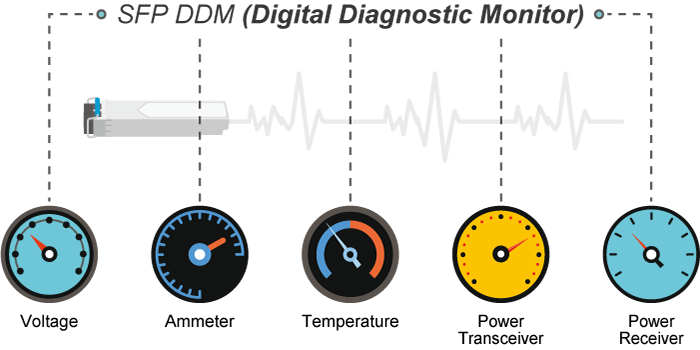
1588 Time Protocol for Industrial Computing Networks
The MGS-6320-2T6S2X is ideal for telecom and Carrier Ethernet applications, supporting MEF service delivery and timing over packet solutions for IEEE 1588 and synchronous Ethernet.
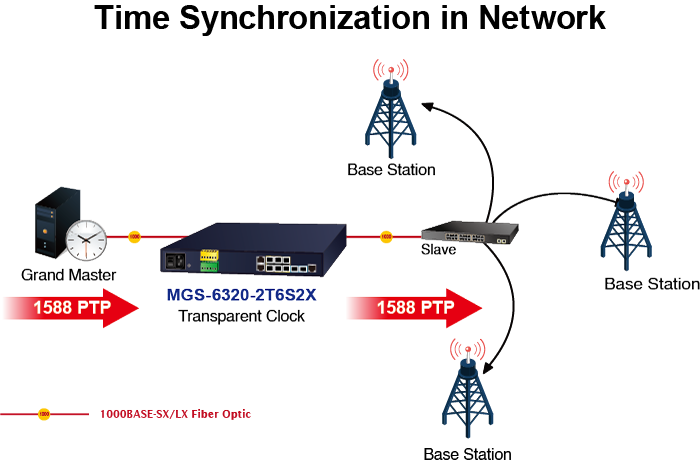
SMTP/SNMP Trap Event Alert
Though most NVR or camera management software offers SMTP email alert function, the MGS-6320-2T6S2X further provides event alert function to help to diagnose the abnormal device owing to whether or not there is a break of the network connection.
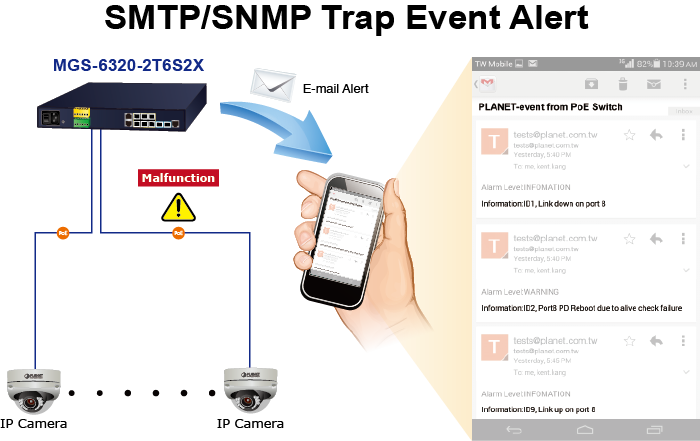
Physical Port
- 2-port 100/1000BASE-T RJ45 copper (Port 1 to port 2)
- 2-port 100/1000X SFP (Port 3 to port 4)
- 4-port 100/1000/2500BASE-X SFP (Port 5 to port 8)
- 2-port 1G/2.5G/10G SFP+ (Port 9 to port 10)
- One RJ45 console interface for basic management and setup
Redundant Power System
- Redundant Power System: 100V ~ 240V AC/Dual 24V ~ 57V DC
- Active-active redundant power failure protection
- Backup of catastrophic power failure on one supply
- Fault tolerance and resilience
Digital Input / Digital Output
- 2 Digital Input (DI)
- 2 Digital Output (DO)
- Integrates sensors into auto alarm system
- Transfer alarm to IP network via SNMP trap
Hardware Design
- -10 to 60 degrees C operating temperature for DC power input only
- 13-inch desktop size, 19-inch rack-mountable
- Relay alarm for port breakdown, power failure
Layer 3 IP Routing Features
- Pv4 dynamic routing protocol supports RIPv2 and OSPFv2 and IPv6 OSPFv3
- IPv6 dynamic routing protocol supports OSPFv3
- IPv4/IPv6 hardware static routing
- Routing interface provides per VLAN routing mode
Layer 2 Features
- Storm Control support
- Broadcast / Multicast / Unicast
- Supports VLAN
- IEEE 802.1Q tagged VLAN
- Up to 4K VLANs groups, out of 4094 VLAN IDs
- Supports provider bridging (VLAN Q-in-Q, IEEE 802.1ad)
- Private VLAN Edge (PVE)
- Port Isolation
- MAC-based VLAN
- IP Subnet-based VLAN
- Protocol-based VLAN
- VLAN Translation
- Voice VLAN
- GVRP
- Supports Spanning Tree Protocol
- STP, IEEE 802.1D Spanning Tree Protocol
- RSTP, IEEE 802.1w Rapid Spanning Tree Protocol
- MSTP, IEEE 802.1s Multiple Spanning Tree Protocol, spanning tree by VLAN
- BPDU Filtering/BPDU Guard
- Supports Link Aggregation
- 802.3ad Link Aggregation Control Protocol (LACP)
- Cisco ether-channel (Static Trunk)
- Maximum 5 trunk groups, up to 10 ports per trunk group
- Provides port mirror (many-to-1)
- Port mirroring to monitor the incoming or outgoing traffic on a particular port
- Loop protection to avoid broadcast loops
- Supports ERPS (Ethernet Ring Protection Switching)
- Compatible with Cisco Uni-directional link detection(UDLD) that monitors a link between two switches and blocks the ports on both ends of the link if the link fails at any point between the two devices
- Link Layer Discovery Protocol (LLDP) and LLDP-MED
- IEEE 1588v2 PTP (Precision Time Protocol)°transparent clock mode
Quality of Service
- Ingress Shaper and Egress Rate Limit per port bandwidth control
- 8 priority queues on all switch ports
- Traffic classification
- IEEE 802.1p CoS
- IP TOS/DSCP/IP Precedence
- IP TCP/UDP port number
- Typical network application
- Strict priority and Weighted Round Robin (WRR) CoS policies
- Supports QoS and In/Out bandwidth control on each port
- Traffic-policing policies on the switch port
- DSCP remarking
Multicast
- Supports IPv4 IGMP Snooping v1, v2 and v3
- Supports IPv6 MLD Snooping v1 and v2
- Querier mode support
- IPv4 IGMP Snooping port filtering
- IPv6 MLD Snooping port filtering
- Multicast VLAN Registration (MVR) support
Security
- Authentication
- IEEE 802.1x Port-based/MAC-based network access authentication
- Built-in RADIUS client to co-operate with the RADIUS servers
- TACACS+ login users access authentication
- RADIUS/TACACS+ users access authentication
- Access Control List
- IP-based Access Control List (ACL)
- MAC-based Access Control List
- Source MAC/IP address binding
- DHCP Snooping to filter un-trusted DHCP messages
- Dynamic ARP Inspection discards ARP packets with invalid MAC address to IP address binding
- IP Source Guard prevents IP spoofing attacks
- IP address access management to prevent unauthorized intruder
Management
- IPv4 and IPv6 dual stack management
- Switch Management Interfaces
- Web switch management
- Console/Telnet Command Line Interface
- SNMP v1 and v2c switch management
- SSHv2, TLSv1.2 and SNMP v3 secure access
- SNMP Management
- Four RMON groups (history, statistics, alarms and events)
- SNMP trap for interface Linkup and Linkdown notification
- IPv6 IP Address/NTP/DNS management
- Built-in Trivial File Transfer Protocol (TFTP) client
- BOOTP and DHCP for IP address assignment
- System Maintenance
- Firmware upload/download via HTTP
- Configuration upload/download via HTTP
- Reset button for system reboot or reset to factory default
- Dual Images
- DHCP Functions
- DHCP Relay
- DHCP Option82
- DHCP Server
- User Privilege levels control
- NTP (Network Time Protocol)
- UPnP
- Link Layer Discovery Protocol (LLDP) and LLDP-MED
- Network Diagnostic
- SFP-DDM (Digital Diagnostic Monitor)
- ICMPv6/ICMPv4 Remote Ping
- Cable Diagnostic technology provides the mechanism to detect and report potential cabling issues
- SMTP/Syslog remote alarm
- System Log
- PLANET Smart Discovery Utility for deployment management
- PLANET NMS system and CloudViewer for deployment management
| Hardware Specifications | |
|---|---|
| Copper Ports | 2 100/1000BASE-T RJ45 auto-MDI/MDI-X ports (Port 1 and port 2) |
| SFP Ports | 2 1000BASE-SX/LX/BX SFP ports (Port 3 and port 4) Compatible with 100BASE-FX SFP. 4 100/1000/2500BASE-X SFP ports (Port 5 and port 8) |
| SFP+ Ports | 2 1000/2500/10GBASE-X SFP ports (Port 9 and port 10) |
| Console | 1 x RJ45 serial port (115200, 8, N, 1) |
| Reset Button | < 5 sec: System reboot > 5 sec: Factory default |
| RAM | 512Mbytes |
| Flash Memory | 64Mbytes |
| Dimensions (W x D x H) | 330 x 153 x 44 mm, 1U high |
| Weight | 1486g |
| Power Requirements | AC 100~240V, 50/60Hz 1A 24V DC @ 1.5A, Range: 24V ~ 57V DC |
| Power Consumption | Max. 16.2 watts/55.2 BTU (AC input) Max. 17.6 watts/60 BTU (DC input) |
| Alarm | One relay output for power failure. Alarm Relay current carry ability: 1A @ DC 24V |
| DI/DO | 2 Digital Input (DI): Level 0: -24V~2.1V (±0.1V) Level 1: 2.1V~24V (±0.1V) Input Load to 24V DC, 10mA max. 2 Digital Output (DO): Open collector to 24VDC, 100mA max. |
| ESD Protection | 6KV DC |
| LED |
System: PWR (Green), DC 1 (Green), DC 2 (Green) DI/DO (Red), Alarm (Red), Ring (Green), Ring Owner (Green) Gigabit RJ45 Ports (Ports 1 to 2) 100 LNK/ACT (Amber) 1G LNK/ACT (Green) Gigabit SFP Ports (Ports 3 to 4) 100 LNK/ACT (Amber) 1G LNK/ACT (Green) Gigabit SFP Ports (Ports 5 to 8) 100 LNK/ACT (Amber) 1G/2.5G LNK/ACT (Green) 10 Gigabit SFP Ports (Ports 9 to 10) 10G LNK/ACT (Amber) 1G/2.5G LNK/ACT (Green) |
| Switching Specifications | |
| Switch Architecture | Store-and-Forward |
| Switch Fabric | 68Gbps/non-blocking |
| Throughput | 50.59Mpps @ 64Bytes packet |
| Address Table | 8K entries, automatic source address learning and aging |
| RAM | 512Mbytes |
| Flash | 64Mbytes |
| Flow Control | IEEE 802.3x pause frame for full duplex Back pressure for half duplex |
| Jumbo Frame | 10KB |
| Layer 3 Functions | |
| IP Interfaces | Max. 32 VLAN interfaces |
| Routing Table | Max. 32 static route entries Max. 1K routing table entries |
| Routing Protocols | IPv4 RIPv1/v2 IPv4 OSPFv2 IPv6 OSPFv3 IPv4 hardware static routing IPv6 hardware static routing |
| Layer 2 Functions | |
| Port Configuration | Port disable/enable Auto-negotiation 10/100/1000Mbps full and half duplex mode selection Flow Control disable/enable Port link capability control |
| Port Status | Display each port’s speed duplex mode, link status, flow control status, auto negotiation status, trunk status |
| Port Mirroring | TX/RX/Both Many-to-1 monitor Supports up to 5 sessions |
| VLAN | IEEE 802.1Q tag-based VLAN, IEEE 802.1ad Q-in-Q tunneling Private VLAN Edge (PVE) MAC-based VLAN Protocol-based VLAN Voice VLAN MVR (Multicast VLAN Registration) GVRP Up to 4K VLAN groups, out of 4094 VLAN IDs |
| Link Aggregation | IEEE 802.3ad LACP/Static Trunk Supports 5 trunk groups with 10 ports per trunk group |
| Spanning Tree Protocol | IEEE 802.1D Spanning Tree Protocol IEEE 802.1w Rapid Spanning Tree Protocol IEEE 802.1s Multiple Spanning Tree Protocol |
| QoS | Traffic classification based, strict priority and WRR 8-level priority for switching - Port number - 802.1p priority - 802.1Q VLAN tag - DSCP/TOS field in IP packet |
| Ring | Supports ERPS, and complies with ITU-T G.8032 |
| IGMP Snooping | IGMP (v1/v2/v3) Snooping, up to 255 multicast groups IGMP Querier mode support |
| MLD Snooping | MLD (v1/v2) Snooping, up to 255 multicast groups MLD Querier mode support |
| Bandwidth Control | Per port bandwidth control Ingress: 500Kb~13128Mbps Egress: 500Kb~13128Mbps |
| Security Functions | |
| Access Control List | IP-based ACL/MAC-based ACL ACL based on: - MAC Address - IP Address - Ethertype - Protocol Type - VLAN ID - DSCP - 802.1p Priority Up to 512 entries |
| Security | Port security IP source guard, up to 512 entries Dynamic ARP inspection, up to 1K entries Command line authority control based on user level Static MAC address, up to 64 entries |
| AAA | RADIUS client TACACS+ client |
| Network Access Control | IEEE 802.1x port-based network access control MAC-based authentication Local/RADIUS authentication |
| Switch Management Functions | |
| Basic Management Interfaces | Console; Telnet; Web Browser; SNMP v1, v2c |
| Secure Management Interfaces | SSHv2, TLS v1.2, SNMP v3 |
| System Management | Firmware upgrade by HTTP protocol through Ethernet network Configuration upload/download through HTTP Remote Syslog System log LLDP protocol NTP PLANET Smart Discovery Utility PLANET NMS system and CloudViewer |
| Event Management | Remote Syslog Local System log SMTP |
| SNMP MIBs | SNMP MIBs RFC 1213 MIB-II RFC 2863 IF-MIB RFC 1643 Ethernet MIB RFC 2863 Interface MIB RFC 2665 Ether-Like MIB RFC 2737 Entity MIB RFC 2819 RMON MIB (Groups 1, 2, 3 and 9) RFC 2618 RADIUS Client MIB RFC 3411 SNMP-Frameworks-MIB IEEE 802.1X PAE LLDP MAU-MIB |
| Standards Conformance | |
| Regulatory Compliance | FCC Part 15 Class A, CE |
| Standards Compliance | IEEE802.3 10BASE-T IEEE802.3u 100BASE-TX IEEE802.3z 1000BASE-SX/LX IEEE 802.3ab 1000BASE-T IEEE 802.3bz 2.5GBASE-X IEEE 802.3ae 10Gb/s Ethernet IEEE802.3x flow control and back pressure IEEE802.3ad port trunk with LACP IEEE802.1D Spanning Tree Protocol IEEE802.1w Rapid Spanning Tree Protocol IEEE 802.1s Multiple Spanning Tree Protocol IEEE802.1p Class of Service IEEE802.1Q VLAN tagging IEEE 802.1x Port Authentication Network Control IEEE 802.1ab LLDP RFC 768 UDP RFC 793 TFTP RFC 791 IP RFC 792 ICMP RFC 2068 HTTP RFC 1112 IGMP v1 RFC 2236 IGMP v2 RFC 3376 IGMP v3 RFC 2710 MLD v1 RFC 3810 MLD v2 RFC 2328 OSPF v2 RFC 2453 RIP v2 |
| Environment | |
| Operating | Temperature: -10 ~ 60 degrees C for DC power input 0 ~ 50 degrees C for AC power input Relative Humidity: 5 ~ 95% (non-condensing) |
| Storage | Temperature: -10 ~ 70 degrees C Relative Humidity: 5 ~ 95% (non-condensing) |




